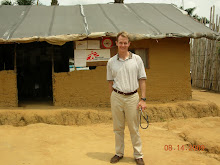
(Photo: local mode of water transport, the pirogue)
MSF's involvement in health care in Lubutu is going to end. Phasing out of a large project such as this is a lengthy process and so plans are being made now to end the organization's activities here. It is likely to be a bumpy transition.
The intervention in Lubutu grew out of past failures. Years ago, and in other parts of Congo, MSF had a wide network of primary care Centres de Santé. Analysis of public health indicators (death rates, for instance) before and after the presence of these primary care services was disappointing. Without a hospital to refer more complicated and severe cases, the Centres de Santé alone did little to lower mortality or morbidity. Thus a new model emerged…. the Lubutu project. It was a risk and a new paradigm for MSF. Go into an area with a very high death rate and quickly open up a referral hospital. Try to get the existing government-run Centres de Santé to refer appropriate patients to that hospital. Finally, take over a couple of the existing Centres de Santé, in order to make them examples of high quality primary care clinics.

(Local consultant Tychique)
It appeared to work. Death rates fell dramatically, up to 80 percent. The result was likely due to a combination of factors (the end of war, an improving economy) but certainly the hospital's opening had an impact. Good for everyone.
But all good things must come to an end. MSF's charter is to respond short term to emergency situations. The organization does not generally engage in long term development. At one time the death rates here were so high that this area did qualify as an emergency environment, but no more. Lubutu was planned as a five year intervention. Three years have passed, two to go.

(Ex-pat Guillaume with palm nuts)
For those of us working here, thoughts of an MSF exit are difficult to imagine. Yes, possibly another non-governmental organization (NGO) can be found to take it all over. Perhaps they will have the resourced to employ all the doctors, nurses, cleaners, orderlies, drivers, pharmacists, operating room assistants, laboratory technicians, and people who cut the grass. Maybe they will be able to maintain the high quality of health care being provided here. But how many other NGOs exist that have 4 million Euro per year to spend on a single project and the organization to manage it all? If no one can be found to take over, then what? What happens to all of the local people who get malaria and can't afford medicine? How about all the malnourished children? And the people with chronic disease who now receive care and medicines for free? Or the women who need emergency caeserian sections?
How do you exit gracefully from the only business in the area that provides referral health care? There are many points to consider. In the best case scenario, MSF quickly finds a partner who can take charge. Then train as many local (Congolese) people to do the jobs that the expatriates are currently doing and concentrate on the present high quality of care.
If no suitable partner can be found, the situation is more problematic. Is it better to work maximally until the end and abruptly withdraw? Or is it smarter to pull out of programs slowly while trying to maintain the health of the population? Should the hospital in Lubutu suffer a slow decline or drop dead?
Our team discussed a few options MSF might have in the remaining two years. One idea I found interesting was to see if eliminating selected hospital services would impact quality of care. For example, how about if the hospital continued working exactly as it does now, but eliminated radiology? It is an expensive part of the system. Does an x-ray really add much to a good clinical examination? Alternatively, what if we eliminated certain expensive medicines? Does doing so increase death rates or the burden of disease in the population? At first these questions sound harsh and morally dubious. But wouldn't it be a good thing to know the minimum requirements needed in a hospital that makes a significant positive impact in the health of a community? That minimum would likely be a less expensive hospital than this one. If it were less expensive, perhaps these "pared down" hospitals which could still continue to positively impact public health would be a good idea for places like Lubutu. Retaining the same positive effects but at lower cost. More hospitals could be opened for the same costs.
MSF has spent a lot of time, money, and effort to develop and expand this project . To have the hospital return to its pre-MSF days of insufficient supplies, unavailable medicines, and turning away patients who could not pay, is a difficult concept to accept. Like me, I am sure that everyone who has participated in the success of this project is hoping that a solution can be found and that the people of Lubutu can continue to enjoy high quality health care.




